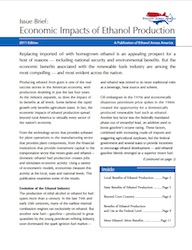The Brazilian sugarcane harvest is in full swing and sugarcane crushing in the South-Central region totaled 2.44 million tons in the second half of December 2010, a 76.39 percent drop from the same period in 2009. This raises the total since the beginning of the 2010/2011 harvest to 555.00 million tons. In early January, only 21 mills were operating in the region and between now and the end of the official harvest on March 31st, numbers are only expected to change slightly.
In the second half of December, sugar production reached 67.48 thousand tons, adding to the 33.46 million tons produced from the beginning of the harvest to December 31, 2010. That total is 18.22 percent more than the amount produced during the same period of 2009, and 16.82 percent more than the final tally for the entire 2009/2010 harvest.
 The country’s ethanol production reached 142.7 million liters in the second half of December. Of this total, 53.24 million liters were anhydrous and 89.23 million were hydrous ethanol. Since the harvest began through the end of December 2010, total ethanol production was 25.27 billion liters, which was an increase up 10.34 percent compared to the same period in 2009. Of this volume, 17.87 billion liters were hydrous ethanol – a 6.25 percent increase from last year, and 7.41 billion liters were anhydrous ethanol, an increase of 21.64 percent from last year.
The country’s ethanol production reached 142.7 million liters in the second half of December. Of this total, 53.24 million liters were anhydrous and 89.23 million were hydrous ethanol. Since the harvest began through the end of December 2010, total ethanol production was 25.27 billion liters, which was an increase up 10.34 percent compared to the same period in 2009. Of this volume, 17.87 billion liters were hydrous ethanol – a 6.25 percent increase from last year, and 7.41 billion liters were anhydrous ethanol, an increase of 21.64 percent from last year.
When you take into account the current harvest is near completion, and compare overall production at the end of December with final numbers for last year’s harvest, there were increases of 2.41 percent in total cane crushing, 16.82 percent in sugar production and 6.71 percent in ethanol production. However, when you only factor ethanol and sugar into the equation, the increase is 11.10 percent.
Sales of ethanol by mills in the South-Central region totaled 2.22 billion liters in December, a 2.64 percent increase compared to the previous month. Of that, 108.33 million liters were exported and 2.11 billion liters went to the domestic market. On the domestic front, 1.50 billion liters of hydrous ethanol were sold in December, a 2.44 percent increase compared to December of 2009. Anhydrous ethanol sales totaled 608.66 million liters against 524.39 million liters in 2009, an increase of 16.07 percent.
During a meeting held on Wednesday Jan.12 with members of the various government organizations, it was determined that there would be continuous monitoring of the ethanol market during the inter-harvest period, with regular meetings between the government and market agents.
“Given the latest figures, it became evident that the current productive scenario offers total peace of mind as far as supplies of ethanol for the domestic market. Mills in South-Central Brazil should produce about two billion litters more ethanol in the current harvest year and, so far, exports are down by more than a billion liters compared to the previous harvest,” said UNICA’s Rodrigues. The numbers show the amount of ethanol available for domestic needs should increase by approximately three billion liters, he added.
 A delegation of representing Michigan ethanol producers hit Capitol Hill on Thursday for a series of meetings with members of Congress and their staff. The fly-in, organized by Growth Energy, was designed to educate lawmakers about the benefits of ethanol.
A delegation of representing Michigan ethanol producers hit Capitol Hill on Thursday for a series of meetings with members of Congress and their staff. The fly-in, organized by Growth Energy, was designed to educate lawmakers about the benefits of ethanol.




 In addition to
In addition to  In rural western Alabama, Coskata, Inc. has received a letter of intent for a $250 million loan guarantee to construct and operate a cellulosic ethanol biorefinery facility. This 55-million gallon-per-year renewable biofuel project will use woody biomass to produce ethanol.
In rural western Alabama, Coskata, Inc. has received a letter of intent for a $250 million loan guarantee to construct and operate a cellulosic ethanol biorefinery facility. This 55-million gallon-per-year renewable biofuel project will use woody biomass to produce ethanol. 



![RFA Conference Logo[2]](http://energy.agwired.com/wp-content/uploads/sites/11/2010/12/RFA-Conference-Logo-300x173.jpg)
